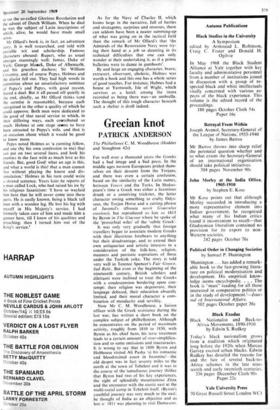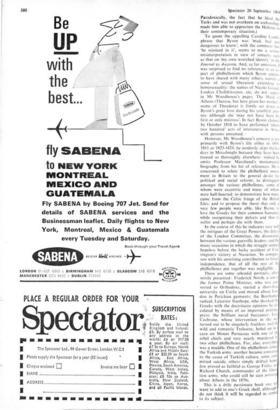Grecian knot
PATRICK ANDERSON
The Philhellenes C. M. Woodhouse (Hodder and Stoughton 42s) For well over a thousand years the Greeks had a bad image and a bad press. In the middle ages western Europeans prided them- selves on their descent from the Trojans, and there was even a certain confusion, based on the similarity of the Latin names, between Teucri and the Turks. In Shakes- peare's time a Greek was either a licentious drunk or a conniving trickster, the latter character owing something to crafty Odys- seus, the Trojan Horse and a cutting phrase of Juvenal's (Oninia now Graeculus esuriens), but reproduced as late as 1813 by Byron in The Giacour where he spoke of the 'proverbial wiles' of the 'subtle Greek'.
It was only very gradually that foreign travellers began to associate modern Greeks with their illustrious forebears to anything but their disadvantage, and to extend their own antiquarian and artistic interests to a consideration of the folk-lore, religion, manners and patriotic aspirations of those under the Turkish yoke. The story is told very well in Terence Spencer's Fair Greece, Sad Relic. But even at the beginning of the nineteenth century, British scholars and dilettanti were inclined to treat the Greeks with a condescension bordering upon con- tempt: their religion was degenerate, their language debased, their education absurdly limited, and their moral character a com- bination of mendacity and servility.
Now Mr C. M. Woodhouse, a liaison officer with the Greek resistance during the last war, has written a short book on the complex subject of philhellenism. Although he concentrates on the period of maximum activity, roughly from 1810 to 1830, with Byron as his chief hero, his terse treatment leads to a certain amount of over-simplifica- tion and to some omissions and inaccuracies. It is wrong to say that in 1809 Byron and Hobhouse visited Ali Pasha 'at his romantic and bloodstained court in Ioannina'—the old despot was in fact seventy miles to the north at the town of Tebeleni and it was in the course of the tumultuous journey thither that Byron had two of his key experiences, the sight of splendidly mountainous Zitza and the encounter with the exotic east at the multi-racial camp in Tebeleni itself. (Byron's youthful journey was very much to the east; he thought of India as an objective and as late a, 1811 was planning to visit Damascus. Paradoxically, the fact that he liked the Turks and was not overkeen on archaeology made him able to appreciate the Hellenes in their contemporary situation.) To quote the appalling Caroline Lamb's phrase that Byron was 'mad, bad and dangerous to know', with the comment that `he rejoiced in it', seems to me a serious misinterpretation in view of remarks such as that on 'my own wretched identity' in the Journal to Augusta. And, as for omissions, was surprised to find no reference to an as- pect of philhellenism which Byron appears to have shared with many others, namely a sense of sexual liberation extending to homosexuality: the names of Nicolo Giraud. Loukas Chalidritsanos, etc, do not appear in Mr Woodhouse's pages. The Maid of Athens (Theresa, but here given her mother's name of Theodora) is firmly set down as Byron's great love during his youthful jour- ney although she 'may not have been his first or only mistress'. In fact Byron claimed by October 1810 to have performed 'above two hundred' acts of intercourse in Attica with persons unnamed. • However, Mr Woodhouse's concern is not primarily with Byron's life either in 1809- 1811 or 1823-1824; he modestly skips the last days in Missalonghi because they have been treated so thoroughly elsewhere—indeed he omits Professor Marchand's monumental biography from his list of references. He is concerned to relate the philhellenic move- ment in Britain to the general desire for political and social reform; to distinguish amongst the various philhellenes, some of whom were eccentric and many of whom were half-hearted; to demonstrate how many came from the Celtic fringe of the British Isles; and to propose the thesis that only a very few people were able, like Byron, to love the Greeks for their common humanity while recognising their defects and thus to suffer and perhaps die with them.
In the course of this he indicates very well the intrigues of the Great Powers, the delays of the London Committee, the dissensions between the various guerrilla leaders, and the many occasions in which the struggle seemed hopeless before the lucky accident of Cod- rington's victory at Navarino. 'In compari- son with his unwitting contribution to Greek independence, that of all the rest of the philhellenes put together was negligible. ..
There are some splendid portraits, often wittily presented: Frederick North, a son of the former Prime Minister, who was con- verted to Orthodoxy, started a short-lived university on Corfu and moved about Lon- don in Periclean garments; the Benthamite radical, Leicester Stanhope, who shocked the Greeks with the doctrinaire opinions he cir- culated by means of an imported printing- press; the brilliant naval buccaneer, Lord Cochrane, whose intervention in the War turned out to be singularly fruitless: and the
i wild and romantic Trelawny, holed up in I
cave on Mount Parnassus with one of I rebel chiefs and very nearly murdered b! two other philhellenes. For, alas, everythin_ was a muddle. One of the philhellenes join the Turkish army, another became convert to the cause of Turkish culture, some co mitted suicide, others simply drifted horn few proved as faithful as George Finlay a Richard Church, commander of the fiber tion army, who could still be seen potter' about Athens in the 1870s.
This is a drily passionate book one WI want to add to one's Greek shelf, although do not think it will be regarded as cent to its subject.









































 Previous page
Previous page